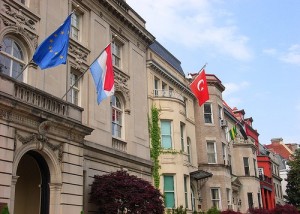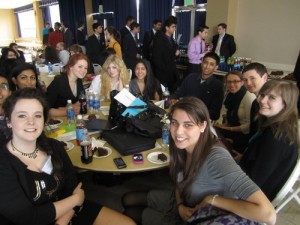This article was written in collaboration with some friends I met while on my high school’s Model UN traveling team. This piece serves to give an experience-based account of what you should do to survive your first conference like a pro. I will use information from the events that took place before, during and after my first conference ever.
Middle school is a confusing and exciting time of our lives, a somewhat-awkward stage where we still cling to childhood while navigating the confusing waters of young adult life. I was only 12 years old in May 2007, the fateful date when I first learned about Model United Nations. A girl from my class and I were scouted to be part of the team that would represent our entire school in the one of the biggest conferences in Latin America. We then found out it was the first time ever that a committee for middle school students would be simulated in the Dominican Republic.
From years prior, I remembered admiring the tall and slick high school students clad in suits and carrying brief cases. In my mind, they were off to save the world and meet with important people. Little did I know, my thoughts were not so far-fetched. After consulting with my friends and looking back to my first conference ever, I want to share some input with you to help make your first MUN experience the smoothest and best one possible:
Before Conference:
1) Your faculty advisor and older club members are your most important resources! Few people will know how to help you navigate your first conference better than your advisor or the more seasoned members of your school’s team. Don’t be afraid to ask questions or seek help, as this shows a genuine interest on your part to learn and grow as an individual.
2) Parents can be a big help, too! My mother is an avid book reader, fluent in five languages and has partaken in important international conferences worldwide. She referred me to books and news pieces that made up the building blocks of my Model UN knowledge. If your parents are really knowledgeable of or work in areas pertaining business, international relations or law, chances are you will have a personal source to help you out during research and overall preparation.
3) Don’t be afraid to contact your assigned country’s embassy or consulate! (You’ll be really surprised). I remember it as clear as day: my first assignment ever was Barbados in the Economic and Social Council. I thought, how could a small Caribbean country possibly make a difference in an ECOSOC debate? My mom and I scoured the internet to no avail, merely finding General Assembly and other committee resolutions mentioning my country’s name as a given document’s signatory. One day, she found the information of Barbados’ embassy in DC and contacted them about my situation. Less than a week later, they were kind enough to send me up-to-date information on and solutions Barbados had adopted for literally every single topic I was assigned.
4) Utilize the United Nations website, CIA World Factbook, and Wikipedia references section. There’s a reason why we mention this so much on the Best Delegate website: the very basics are the best sources to start with, and you should never overlook them. Even though Wikipedia should never be cited as a source, the “References” sections of its entries are useful resources you can use to help build and back your research.
5) Keep separate sheets for your topic solutions. Position papers, your country’s proposals, actual investigation, etc. should be all clearly divided into different sections, with your position papers and proposals as the very first documents per topic in your binder.
6) Practice your basic speech ideas as much as possible. Humans are highly sensory beings, so it is only natural that we learn through trial and error. Keeping a reference sheet of your main points and constantly practicing your arguments in favor of them will help you walk into committee ready to accept any and all questions or concerns other delegates may have.
7) Encourage your parents to attend! This is not a must, but one of the biggest things that helped me have a great first Model UN experience was having my mother be one of my school’s chaperones. Back in the day, I had never traveled alone, and I certainly didn’t want to be alone during such a huge event as MUN. My mom gave me enormous support and encouragement before committee, gave me advice on how to deal with certain situations, and accompanied me and my other middle school friends around the hotel so we wouldn’t get lost. If your school allows it, do encourage at least one of your parents to go with you on your first conference!
8) Office Depot or pretty much any office supply store is your best friend. This is pretty much self explanatory: post-its will become your soul mates after your first conference, guaranteed. Be sure to buy a cheap box of pens, a notepad, post-its and a sturdy binder or pad to keep your research in.
During Conference:
1) Stick with an older buddy. Coming from one of the most important tourist destinations in Latin America, I can’t stress enough how important older figures were in my first conference. At my first conference, I didn’t have a cellphone, and during opening ceremonies my mother, advisor and I were separated and seated in completely different areas. Luckily, I was with one of the seniors in my team, and she and her friends kept an eye on me until I was reunited with my advisor.
2) Be sure to locate your hotel’s/convention center’s key areas the day before committee starts. Locating your committee room, the bathrooms, water fountains, and dining halls/restaurants the day before the first session is an often overlooked step in making your conference experience a smooth one. This way, you won’t have to wake up extremely early or get lost in the confused crowd of delegates the day committee actually starts. You can relaxedly walk into your room, set everything up, and use those few extra minutes before session to mingle with other delegates.
3) Easiest way to break the tension? Introduce yourself! After you’ve survived the struggle that is getting to your room, steal a quick glance at other delegates’ badges to see whether or not you’re in the same committee. Chances are they’ll feel lost in the ensuing confusion, and a friendly face is always a welcome sight no matter the circumstance.
4) Schedule working lunches and/or dinners where you can get better acquainted with people in your committee. Identify delegates you need to work with due to your country’s policies and people you genuinely like, and send them post-its inviting them to lunch! Schedule a meeting place during your breaks and hang out together to both discuss your topics and get to know each other. Which leads to my next point…
5) Enjoy the social aspect! You may be there for the prestige, the gavel or the good grade in your World History class, but at the end of the day, you’re dealing with people. Even important U.N figures take some time to kick back and relax, such as the time when Ban Ki-Moon performed the Gangnam Style dance with PSY!
6) Respect curfews and get enough sleep. Some of you may thrive in the “work hard, play hard” mentality, but truth be told, as a current college student, the value of a good night’s sleep is underestimated. Also, if your advisor establishes a curfew, respect it! If you disregard something as simple as a curfew, chances are your advisor won’t think of you as a person responsible enough to attend future conferences.
After Conference:
1) Request feedback from your advisor and older club members. Be it in written or spoken form, be sure that you know what you did well and what you can improve on. Even if you decide not to continue doing Model UN, honing the interpersonal and professional skills you learned before and during a conference can help you reach far and wide in your academic, personal, and professional lives.
2) If MUN was something you enjoyed, ask your advisor what other conferences your school will be attending. That way, you can plan ahead of time, secure funding, and prepare early!
3) Stay in touch with the people you met! My first conference was during the time where MSN Messenger was the most popular chatting service, but now that we have resources such as Skype and Facebook, you can remain a part of someone’s life with the click of a mouse! Model UN is a place where you can meet some of the most inspiring and highly motivated people ever. Keeping in contact with these kinds of individuals will ensure that your life has no shortage of excitement and that every day will be a new learning and growing experience.



